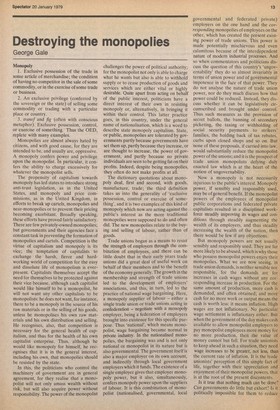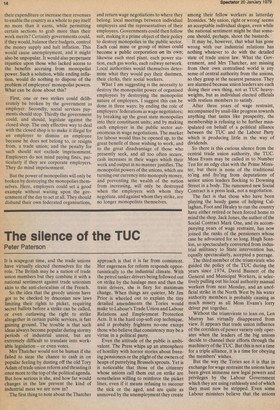Destroying the monopolies
George Gale
Monopoly 1. Exclusive possession of the trade in some article of merchandise; the condition of having no competitor in the sale of some commodity, or in the exercise of some trade or business.
2. An exclusive privilege (conferred by the sovereign or the state) of selling some commodity or trading with a particular place or country.
3. transf and fig (often with conscious metaphor). Exclusive possession, control, or exercise of something. Thus the OED, replete with many examples.
Monopolies are almost always hated by citizens, and with good cause, for they are intended to be, and usually are, oppressive. A monopoly confers power and privilege upon the monopolist. In particular, it confers the ability to charge excessively for whatever the monopolist sells.
The propensity of capitalism towards monopoly has led states to introduce strong anti-trust legislation, as in the United States, and monopoly and price commissions, as in the United Kingdom, in efforts to break up cartels, monopolies and near-monopolies or to prevent their pricing becoming exorbitant. Broadly speaking, these efforts have proved fairly satisfactory. There are few privately-owned monopolies; but governments and their agencies face a constant task in preventing the formation of monopolies and cartels. Competition is the virtue of capitalism and monopoly is its vice; the temptation of capitalists to exchange the harsh, fierce and hardworking world of competition for the easy and dissolute life of monopolism is everpresent. Capitalists themselves accept the need for themselves to be protected against their vice because, although each capitalist would like himself to be a monopolist, he will not want any other capitalists to be monopolists: he does not want, for instance, there to be a monopoly in the source of his raw materials or in the selling of his goods, unless he monopolises his own raw materials and his own distribution and selling. He recognises, also, that competition is necessary for the general health of capitalism, and thus for the health of his own capitalist enterprise. Thus, although he would like monopoly for himself, he recognises that it is in the general interest, including his own, that monopolies should be resisted by the state.
In this, the politicians who control the machinery of government are in general agreement, for they realise that a monopolist will not only amass wealth without risk, but will also acquire power without responsibility. The power of the monopolist challenges the power of political authority; for the monopolist not only is able to charge what he wants but also is able to withhold supply or to cease production of goods and services which are either vital or highly desirable. Quite apart from acting on behalf of the public interest, politicians have a direct interest of their own in resisting monopoly or, alternatively, in bringing it within their control. This latter practice goes, in this country, under the general name of nationalisation, which is a word to describe state monopoly capitalism. State, or public, monopolies are tolerated by governments partly because governments have set them up, partly because they increase, or are thought to increase, the power of government, and partly because no private individuals are seen to be getting fat on their profits. Indeed, despite being monopolies, they often do not make profits at all.
The dictionary quotations about monopoly deal, first and second, with goods, manufacture, trade; the third definition takes us into the generality of 'exclusive possession, control or exercise of something', and it is two examples of this kind of monopoly which now are acting against the public's interest as the more traditional monopolies were supposed to do and often did. The new monopolies relate to the buying and selling of labour, rather than of goods.
Trade unions began as a means to resist the strength of employers through the combination of employees, and there can be little doubt that in their early years trade unions did a great deal of useful work on behalf of their members and to the benefit of the economy generally. The growth in the membership and strength of trade unions led to the development of employers' associations, and this, in turn, led to the practice of national wage bargaining. Here, a monopoly supplier of labour — either a single trade union or trade unions acting in confederation — negotiate with a monopoly employer, being a federation of employers brought into existence for this specific purpose. Thus 'national', which means monopolist, wage bargaining became normal in private industry. In the nationalised monopolies, the bargaining was and is not only national or monopolist in its nature but is also governmental. The government itself is also a major employer on its own account, and indirectly through local government employers which it funds. The existence of a single employer gives that employer monopoly power, but it also, simultaneously, confers monopoly power upon the suppliers of labour. It is this combination of monopolist (nationalised, governmental, local governmental and federated private) employers on the one hand and the cor responding monopolies of employees on the other, which has created the present exist ing power of trade unions. This power is made potentially mischievous and even ,calamitous because of the interdependent nature of modem industrial processes. And so when commentators and politicians dis cuss the question of this country's `ungovernability' they do so almost invariably in terms of union power and of governmental impotence in the face of that power. They do not analyse the nature of trade union power, nor do they much discuss how that power could be reduced. Instead, they discuss whether it can be legislatively cumscribed and brought under control. Thus such measures as the provision of secret ballots, the banning of secondary picketing, the taxing of withholding of social security payments to strikers' families, the holding back of tax rebates, curbs upon closed shops and so on. But none of these proposals, if carried into law, would substantially reduce the monopolist power of the unions; and it is the prospect of trade union monopolists defying duly enacted law which is at the heart of the notion of ungovernability.
Now a monopoly is not necessarily injurious to the public's interest. Monopoly power, if sensibly and responsibly used, may be of general benefit. If the monopolist powers of the employees of monopolist public corporations and federated private capitalists resulted in a disciplined workforce steadily improving its wages and con ditions through steadily augmenting the wealth of its employers, and thus steadily increasing the wealth of the nation, then there would be few if any objections.
But monopoly powers are not usually sensibly and responsibly used. They are far more likely to be abused, which is why those who possess monopolist powers enjoy their monopolies. What we are now seeing, in trade union demands, is neither sensible nor responsible, for the demands are for increases in cash wages without any cor responding increase in production. For the same amount of production, more cash is demanded, and often obtained; and more cash for no more work or output means the cash is worth less: it means inflation. High wages are not inflationary. No particular wage settlement is inflationary either. But when the government of the day makes cash available to allow monopolist employers to pay monopolist employees more money for no more production, then the value of money cannot but fall. For trade unionists to keep ahead in such a situation, they need wage increases to be greater, not less, than the current rate of inflation. It is the trade unionists' perception of this simple fact of life, together with their appreciation and enjoyment of their monopolist powers. that is at the root of the present discontents.
Is it true that nothing much can be done? Can governments do little but exhort'? Is it politically impossible for them to reduce their expenditure or increase their revenues to enable the country as a whole to pay itself no more than it earns, while permitting certain sections to grab more than their work merits? Certainly governments could, if they would, balance their budgets, control the money supply and halt inflation. This would cause unemployment, and it might also be unpopular. It would also perpetuate injustice upon those who lacked access to the benefits accruing from monopolist power. Such a solution, while ending inflation, would do nothing to dispose of the problem of employees' monopolist powers. What can be done about this?
First, one or two strikes could deliberately be broken by the government as employer. Secondly, social services payments should stop. Thirdly the government could, and should, legislate against the closed shop. The only effective way to deal with the closed shop is to make it illegal for an employer to dismiss an employee because he does not belong to, or resigns from, a trade union; and the penalty for such should not exclude imprisonment. Employers do not mind paying fines, particularly if they are corporate employers. They do mind imprisonment.
But the power of monopolists will only be broken by destroying the monopolies themselves. Here, employers could set a good example without waiting upon the government of the day to act at all. They should disband their own federated organisations, and return wage negotiations to where they belong: local meetings between individual employers and the representatives of their employees. Governments could then follow suit, making it a prime object of their policy to destroy monopolies in the public sector. Each coal mine or group of mines could become a public corporation on its own; likewise each steel plant, each power station, each gas works, each railway network. Local authorities would themselves determine what they would pay their dustmen, their clerks, their social workers.
What I am suggesting is the necessity to destroy the monopolist power of organised employees by destroying the monopolist nature of employers. I suggest this can be done in three ways: by ending the role of employers' federations as wage negotiators; by breaking up the great state monopolies into their constituent units; and by making each employer in the public sector autonomous in wage negotiations. The market for labour would thus be opened up, to the great benefit of those wishing to work, and to the great disadvantage of those who presently seek, and all too often secure, cash increases in their wages which their work and output in no manner justifies. The monopolist powers of the unions, which are turning our currency into monopoly money, and preventing the wealth of the nation from increasing, will only be destroyed when the employers with whom they negotiate, and against whom they strike, are no longer monopolists themselves.



































 Previous page
Previous page